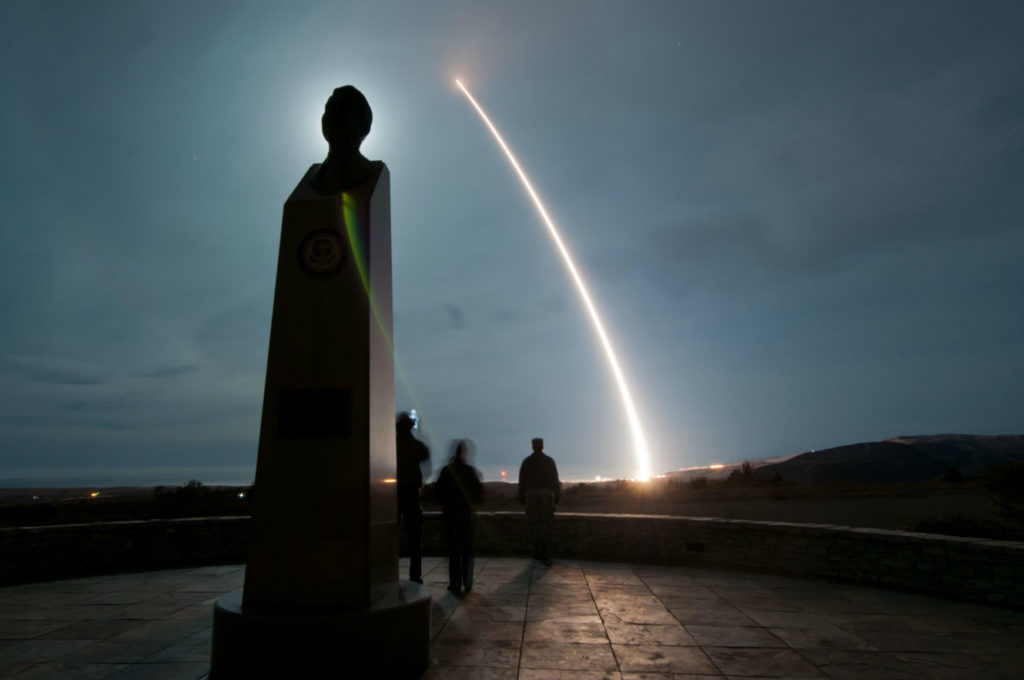Now’s Not the Time to Lower America’s Nuclear Guard, Mr. President

Harry Truman, the first and last world leader to order the use of nuclear weapons, called them “the most terrible thing ever discovered.” No one would disagree with the sentiment behind President Obama’s desire to abolish them. However, reports that the president is contemplating far-reaching changes to U.S. nuclear posture before he leaves office are disturbing.
According to The Washington Post, the administration is debating options including declaring a “no first use” policy, reducing the alert status of U.S. nuclear weapons, and further delaying the modernization of America’s increasingly obsolete nuclear arsenal.
Proponents of these ideas claim they would reduce tensions and the risk of escalation or inadvertent nuclear conflict. Unfortunately, the opposite is true: Despite their superficial appeal, these measures would be deeply destabilizing.
No future president would want to make the choice Harry S. Truman had to make in August 1945, but there is no way of knowing what circumstances may confront America in coming years. Sometimes, nuclear weapons are the only way to offset a large mismatch in conventional forces — for example in Cold War Europe and on the Korean Peninsula. They may also be the only the way to prevent a catastrophic chemical, biological, or cyber-attack. A no-first use policy is unlikely to convince U.S. nuclear rivals to change their plans and could one day needlessly tie a president’s hands.
Lowering their alert status and making it harder to deploy nuclear weapons creates a perverse incentive for adversaries to strike first.
It is true that modernizing the U.S. nuclear stockpile will cost hundreds of billions of dollars at a time when the defense budget is under pressure. Yet further delay will only shed more doubt on America’s seriousness of purpose, reducing its credibility and weakening deterrence, all of which makes war more rather than less likely.
Lowering the United States’ nuclear guard might make more sense if the world was entering a new golden age of peace and de-nuclearization. But, look around: Instability is growing and nuclear weapons are once again taking on more, not less, importance.
Russia is modernizing its strategic forces and openly threatens to use nuclear weapons in eastern Europe. It is easy to dismiss this as bluster, but President Putin has already used force to change Europe’s borders — the first time this has occurred since 1945. Western military planners worry that conventional NATO forces in Eastern Europe may be insufficient to deter a Russian move on the Baltics, even though they are being augmented.
The nuclear deal with Iran may or may not have been the best way to stop Iranian efforts to obtain nuclear weapons. But Iran’s subsequent behavior — particularly strenuous efforts to develop ballistic missiles and reports it plans to install more centrifuges in ten years to enrich uranium — give little comfort that it has abandoned its designs. Other Middle Eastern powers are anxiously assessing their own options.
In Asia, North Korea’s unpredictable dictator Kim Jong-un already has nuclear weapons, and is developing land and submarine-delivered missiles to launch warheads at targets in Asia, the Pacific, and as far as the American mainland. Last week, a missile landed within 200 miles of Japan.
As well as deploying new conventional weapons to constrain U.S. forces’ ability to project power and defend allies in the Western Pacific, China is modernizing, diversifying, and building up its nuclear forces. If anything its strategists are contemplating lowering, not raising, the threshold for using nuclear weapons.
Then, of course, there is the U.S. presidential election, which among other firsts has featured the Republican nominee bashing longstanding allies and telling Japan and the Republic of Korea to get their own nuclear weapons. It may be a campaign in which one day’s foreign policy pronouncement is airily dismissed the next as “sarcasm.” Nonetheless, there is little to comfort anxious allies — and much to hearten potential international aggressors.
Allies don’t vote, but they shouldn’t be ignored. By providing extended deterrence, U.S. nuclear weapons not only defend the United States but also reassure allies and help to convince them not to obtain their own. Rising tensions and instability in Europe, Asia, and the Middle East mean that American allies already face significant threats. Giving them cause to doubt the reliability of the U.S. nuclear deterrent will only feed their insecurity and make them less dependable partners. It will also stoke strategic competition in Asia and the Middle East, spur proliferation, and increase the risk that nuclear weapons are used some day —the precise opposite of what the White House intends. Japan has already expressed concern.
So what should Obama do instead during his remaining months in office?
Boosting conventional deterrence would be a good start — including by working with Congress to return U.S. defense spending to pre-sequester levels, fund new conventional strike weapons, and give the military much-needed budget certainty. He should do more to reassure nervous American allies and recognize that deterring Russia, China, and Iran matters more than accommodating them. He should tighten the screws on North Korea. He should push ahead with missile defense, including deployments in Europe and South Korea, irrespective of posturing from Moscow and Beijing. And he should proceed with the long-overdue modernization of America’s aging nuclear stockpile.
U.S. presidents occasionally get the nuclear wobbles, generally for good motives. Ronald Reagan detested nuclear weapons and famously almost bargained them away with Mikhail Gorbachev. But he didn’t. Instead his legacy was the peaceful defeat and collapse of Soviet expansionism and the end of the Cold War.
A U.S. president today looking to burnish his own legacy would be well advised to follow Reagan’s example and think again.
Andrew Shearer is senior advisor on Asia Pacific security at the Center for Strategic and International Studies. He was formerly national security advisor to Australian prime ministers Howard and Abbott.
Image: U.S. Air Force photo, Airman 1st Class Yvonne Morales

